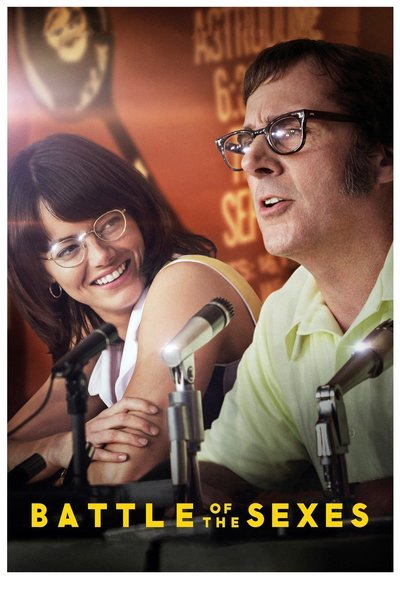
Now streaming on:
Going into “Battle of the Sexes,” one might expect an equally-balanced look at the lives of self-proclaimed chauvinist Bobby Riggs and tennis superstar Billie Jean King. This is not that movie. And it shouldn’t be really. The best angle of the film is the way it illuminates the difference between fighting for equality and battling to hold on to perceived superiority. Of course, this is a fight that continues to this day, and not just in terms of gender. If anything, there’s a better version of “Battle of the Sexes” that focuses even more fully on King, villainizing Riggs and his grotesque culture of sexism in a way this movie disappointingly seems scared to do. The material involving King’s fight for equality is powerful, and the performances are uniformly strong, but there’s a TV movie approach to the emotion and truth of this situation that softens it in detrimental ways. It’s not a “bad” film, but Billie Jean King’s story could have been so much deeper. It’s a movie that doesn’t hit nearly as hard as she did.
King is played by the Oscar-winning Emma Stone, who captures her unique blend of determined grit and awkward social behavior. Her take on King is relatively shy and spotlight-averse, the opposite of the gregarious Bobby Riggs, portrayed by Steve Carell. A gambling addict, the 55-year-old Riggs has lost his drive, looking for the next hustle to keep him happy, even as his bad habits frustrate his wife, played in a totally thankless role by Elizabeth Shue. When the head of the Tennis Association, played with an almost caricature degree of smarm by Bill Pullman, offers a tournament in which the female winner will get $1,500 while the male winner gets $12,000, King jumps ship, and she takes almost every female tennis player that matters with her. Led by Gladys Heldman (Sarah Silverman), the ladies form their own tennis tour, and the world notices, including Bobby Riggs.
While Riggs is looking for his next big thing, King is confronted with something she didn’t expect, a romance with her hairdresser, Marilyn Barnett (Andrea Riseborough). Happily married to Larry (Austin Stowell), Billie Jean never expected to fall in love with another woman, and it’s the kind of affair that could destroy her career, especially as the new tour is trying to find sponsors. With this new romance as the backdrop, King ends up agreeing to a one-time match with Riggs, who believes that an over-the-hill male tennis player can still beat the #1 young, female tennis champion. While a lot of the people around her see this as just a gimmick, she realizes the message it could send to the world if she loses.
With copious amounts of ‘70s style and music, directors Jonathan Dayton and Valerie Faris (“Little Miss Sunshine”) work hard to recreate a period in which male chauvinism could still be very easily taken as a public position. It’s hard to imagine a dinosaur like Bobby Riggs getting any attention beyond a small core of morons nowadays. Even if his brand of sexism is depressingly alive and well, it’s not the kind of thing sports announcers openly defend. Listening to Howard Cosell and company legitimize Riggs’ worldview shows how much of a culture King had to work to tear down.
However, it also makes one wonder why writer Simon Beaufoy didn’t take a tougher stance against Riggs. Scenes with his wife and child are clearly designed to humanize him in a way that feels oddly disingenuous. At one point, he’s a goofy charmer, but then we see how much larger a hill that King had to climb because of the Riggs brand of sexism and it’s hard not wish the movie didn’t too often treat him as a harmless clown. There’s a better version of “Battle of the Sexes” that focuses more completely on just King because this half-developed, comedy approach to Riggs’ life doesn’t add enough to this version.
As for performances, Dayton & Faris have always been strong with an ensemble, and that’s true here as well. Stone is subtle and powerful, but Riseborough actually gives my favorite performance of the film, playing someone who feels more three-dimensional than the icons at the center of the piece. Similarly, Alan Cumming does a lot with just a few scenes, which isn’t that unusual for him. Less fortunate are Shue and Pullman, turned into the archetypes of the Frustrated Wife and the Sexist Boss. The final scenes of Pullman sneering as he watches the match might as well have had him twirling a curled mustache. It’s that superficial approach to the world around Billie Jean King that diminishes her story. Instead of a timeless story, this feels like a Hollywood production that softens what was truly and genuinely a battle, one that women are still fighting today.
This review was originally filed on September 12, 2017 from the Toronto International Film Festival.
Brian Tallerico is the Managing Editor of RogerEbert.com, and also covers television, film, Blu-ray, and video games. He is also a writer for Vulture, The Playlist, The New York Times, and GQ, and the President of the Chicago Film Critics Association.







121 minutes
Emma Stone as Billie Jean King
Steve Carell as Bobby Riggs
Andrea Riseborough as Marilyn Barnett
Sarah Silverman as Gladys Heldman
Alan Cumming as Ted Tinling